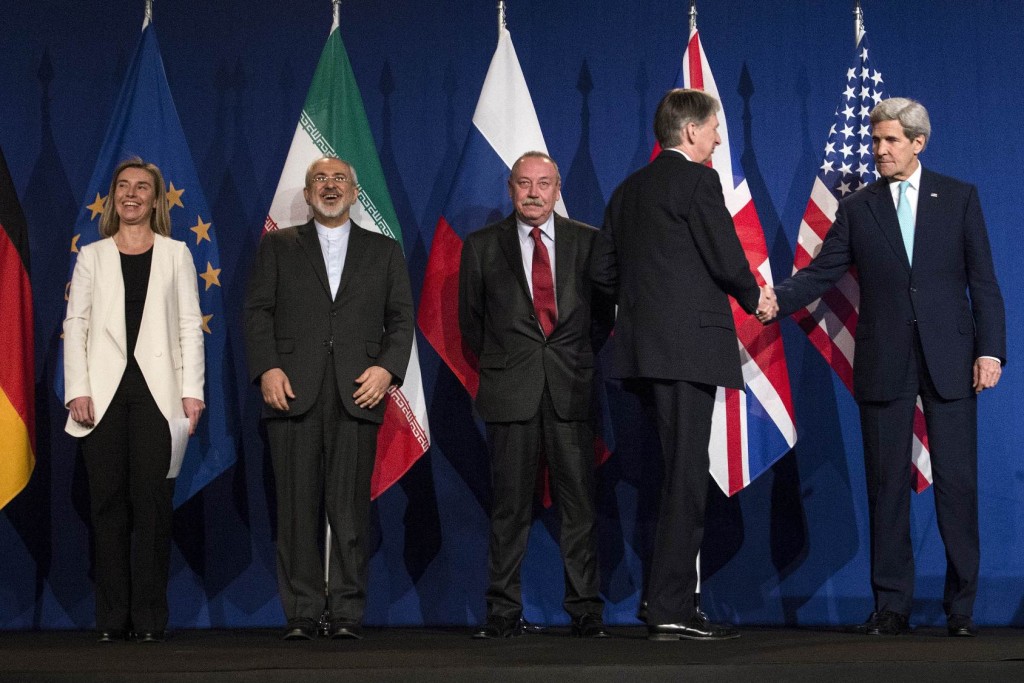- California Assembly OKs highest minimum wage in nation
- S. Korea unveils first graphic cigarette warnings
- US joins with South Korea, Japan in bid to deter North Korea
- LPGA golfer Chun In-gee finally back in action
- S. Korea won’t be top seed in final World Cup qualification round
- US men’s soccer misses 2nd straight Olympics
- US back on track in qualifying with 4-0 win over Guatemala
- High-intensity workout injuries spawn cottage industry
- CDC expands range of Zika mosquitoes into parts of Northeast
- Who knew? ‘The Walking Dead’ is helping families connect
Seoul hopes Iran’s nuke deal can help resolve N. Korea nuke

From left, European Union High Representative for Foreign Affairs and Security Policy Federica Mogherini, Iranian Foreign Minister Javad Zarifat, an unidentified Russian official, look on as British Foreign Secretary Philip Hammond shakes hands with US Secretary of State John Kerry as they arrive at the Swiss Federal Institute of Technology, or Ecole Polytechnique Federale De Lausanne, in Lausanne, Switzerland, Thursday, April 2, 2015, after Iran nuclear program talks finished with extended sessions. The United States, Iran and five other world powers on Thursday announced an understanding outlining limits on Iran’s nuclear program so it cannot lead to atomic weapons, directing negotiators toward achieving a comprehensive agreement within three months. (AP Photo/Brendan Smialowski, Pool)
SEOUL, April 3 (Yonhap) — South Korea’s nuclear envoy on Friday expressed hope that a tentative deal to curb Iran’s nuclear program could pave the way for helping resolve North Korea’s nuclear weapons program.
The Iran deal, announced in Lausanne, Switzerland on Thursday, calls for limiting Iran’s nuclear program in exchange for the U.S. and others lifting sanctions that have stifled the Middle Eastern nation’s economy. Negotiators plan to put the tentative deal in a final agreement by June 30.
Hwang Joon-kook, Seoul’s chief negotiator for the six-party talks aimed at North Korea’s denuclearization, said that despite differences over nuke activities between Pyongyang and Tehran, the Iran deal could have a big implication for the North’s nuclear program.
“I hope that the Iran deal could help create a positive atmosphere in resolving North Korea’s nuclear issue through negotiations such as the six-party talks,” Hwang said.
The six world powers — the U.S., Britain, France, Germany, Russia and China — have held years of the so-called “P5 plus one” negotiations with Iran to restrain Teheran’s nuclear activities.
The deal has received highlight as it could affect the long-running impasse in the North Korean nuclear issue.
But many experts said that the Iran deal is not likely to revive Washington’s interest in resolving North Korea’s nuke standoff as the two cases are different.
They said Iran’s situations are different from those of North Korea, given that Iran has not pulled out of the Nuclear Non-Proliferation Treaty (NPT) and it has neither conducted nuclear tests nor declared itself as a nuclear state.
“Despite such differences, we hope that North Korea will show sincerity for coming to the negotiation table,” a Seoul official said, requesting anonymity.
The six-party talks on Pyongyang’s nuke program have been dormant since late 2008 as the North left the negotiating table. The six-party talks involve the two Koreas, the U.S., China, Japan and Russia.
Except for the North, South Korea and the other four nations to the six-party talks have recently reached a consensus for exploratory talks to gauge the North’s willingness for denuclearization. They have also shared the view for conditions for resuming the long-stalled talks.
Since a nuke test in 2013, North Korea has demanded the unconditional resumption of the six-party talks, but Seoul and Washington have claimed that the North should first show its sincerity toward denuclearization.















